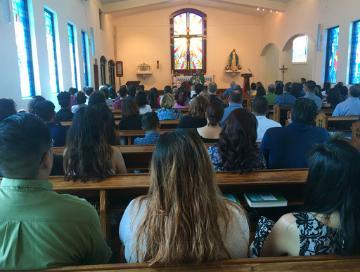
Jessica Coblentz is an assistant professor of theology & religious studies at Saint Mary’s College of California. She is a 2008 graduate of SCU, where she was also a Hackworth Fellow at the Ethics Center. Views are her own.
Following the release of the Philadelphia Grand Jury Report, the story of Naka Nathaniel went viral. Nathaniel, a Catholic father with a son on the brink of making his First Communion, interrupted the homily during a Sunday liturgy in the suburbs of Atlanta. A story of his bold stand spread on Twitter, prompting a widely-read New York Times op-ed where Nathaniel recounts, “The priest addressed the report…He said the church had to change. Then he began to move on. I couldn’t help myself. I stood up and yelled out: ‘Father!’ He turned and I asked him, simply: ‘How?’” While the priest offered a few concrete suggestions from the pulpit, Nathaniel reports that later the pastor privately expressed resignation, telling him, “You and I have no influence.”
I suspect that Nathaniel’s story garnered such attention because it displays a moral conviction that troubles the consciences of many Catholics. Faced with the evil of clerical abuse and its cover-up in our Church, we feel that all Catholics must do something to rectify this wrongdoing and prevent it from happening again. Yet, like Nathaniel and his priest, many of us are unsure of how.
Discerning a moral path forward is daunting not only because of the complexities of the Church’s ethical failings but also because most Catholics (especially but not exclusively lay Catholics like me) are uninformed about how we might exercise our own agency within the multifaceted hierarchical structures of the Church. Deliberating the ethical question, “What should we do?” requires that Catholics know their options—that is, they must know what they can do within the Catholic community—and most laypeople never learn about the roles and responsibilities of the laity in their parochial religious education courses. Instead, many of us operate with the limited and outdated impression that laypeople are to “pray, pay, and obey” while our ordained ministers exercise the active work of God in the Church. Clericalism, which prizes the work of the priest above all, bolsters this assumption.
The ongoing clergy abuse crisis confronts us with the importance of education about the agency of lay Catholics within the Church. This is not unlike how recent crises in the U.S. political landscape have spurred residents to refresh their knowledge of their rights and responsibilities and work accordingly to maximize their civic agency. The current ecclesial situation requires us to do the same: We must learn about the workings of the Church and all its members. We must learn the parameters of our leaders’ powers and responsibilities. We must educate ourselves about what lay Catholics—those of us who make up the vast majority of the church—can do. We cannot be active participants in the life of the Church in ordinary times or in times of moral crisis like this if we don’t know the possibilities of our own agency within it.
While many clergymen can aid us in this pursuit, we don’t require it. With the assistance of excellent, accessible Catholic theology books, we lay people can educate ourselves about our own agency in the Church. I recommend starting with Richard Gaillardetz’s By What Authority: Foundations for Understanding Authority in the Church (Liturgical Press, 2018), a book I’m teaching in my undergraduate theology course this semester with hopes that it will empower my students with the knowledge they need to participate actively in deliberations about how we can and should proceed as a Church in the wake of these recent atrocities.
With greater knowledge about the workings of the Church and our respective roles within it, we may conclude, like Nathaniel’s pastor, that most individuals “have no influence,” no ability to respond to the pangs of conscience that plague us. This despairing conclusion is a real possibility in light of the gross disparities in authority that exist within contemporary Catholicism. It is one that I, as a Catholic theologian, have been tempted by throughout my adult life, not only amid our present crisis. Still, education about the structure of the Church and the authority of its members will enable us to reach this or any other conclusion based on our own informed assessments. And in the process, greater knowledge of the workings of the Church may also uncover agency we didn’t know we had as laypersons. This, too, has been my experience, and it has been remarkably empowering.
